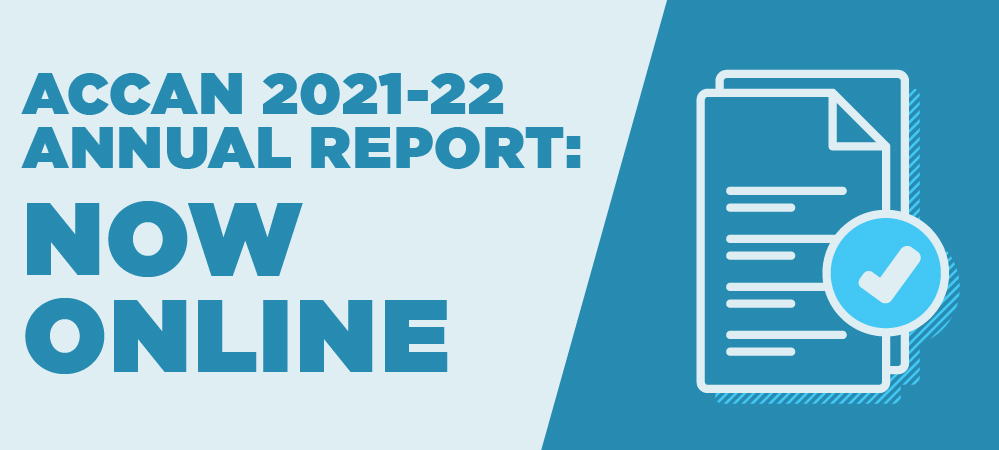 |
This week
IN THE NEWS: ACCAN 2021-22 Annual Report now available online, TPG Telecom to shut down 3G network, and more.
|
 |
|
It gives us great pleasure to present ACCAN’s 2021-22 Annual Report. During the year, ACCAN’s output of work has been extraordinary, with the team providing input to 62 submissions and supporting 12 grants projects, while generating well over 500 media mentions. ACCAN has actively contributed to a wide range of policy discussions throughout the year. While these are too numerous to mention in this report, some highlights include our work on the NBN Co. pricing review, addressing consumer data and privacy issues, and contributing to the triennial Regional Telecommunications Review. To read the full report, visit our website.
|
|
|
|
TPG Telecom will shut down its 3G network in December 2023. The company said its announcement should give remaining 3G customers time to upgrade their devices and services to 4G or 5G. “The retirement of older network technologies like 3G is part of an important industry-wide move to provide customers with better speed and greater functionality with today’s modern smartphones and devices," CTO Giovanni Chiarelli said. [iTNews]
|
|
The NSW state government has changed its stance on re-issuing identity documents in the wake of the huge Optus data breach. Minister for customer service and digital government Victor Dominello announced on LinkedIn that the NSW government has set up a helpline for citizens affected by the breach. The service, ID Support NSW, is on 1800 001 040. [iTNews]
|
|
The telecommunications watchdog has put telcos on notice after receiving the highest proportion of complaints it has received in five years about mobile phone services. Complaints also included a high number about poor mobile phone coverage and dropouts. Lewis Adey, who runs a yoga retreat in the Hawkesbury, had to spend $6000 installing a new satellite dish to get mobile phone coverage in his flood-prone town. “We are less than 100 kilometres from Sydney and don’t get any mobile phone access,” he said. [SMH]
|
|
The eSafety Commissioner has launched new resources to help the LGBTIQ+ community safely navigate the online world, featuring guidance on a range of issues, from dealing with trolls to meeting people online. LGBTIQ+ people are more than twice as likely to experience online hate speech than other Australians, with 30 per cent targeted compared to 14 per cent of the general population, according to eSafety research. [eSafety]
|
|
Professor Asha Rao, Associate Dean of Mathematical Sciences at RMIT University, says Australia needs new laws to prohibit companies from engaging in unnecessary data harvesting. She says we also need "severe penalties" for companies that fail to protect customer data, similar to penalties for violations of money laundering and counter-terrorism financing laws. [ABC]
|
|
Through Good Things Foundation’s network of community organisations and with the help of our supporters, free digital skills events will take place in hundreds of communities this October to support people to get online. During Get Online Week 2021, over 450 community organisations around Australia held more than 1,000 online or COVID-Safe face-to-face events for people with low digital skills, reaching 15,400 people with support. Head to the Get Online Week website for more information [Get Online Week]
|
|
The Victorian Institute of Technology (VIT) will undergo an independent review of its practices to comply with Australia’s anti-spam laws after an Australian Communications and Media Authority (ACMA) investigation found VIT sent more than 6,000 marketing emails without consent. VIT sent the messages promoting its courses in September 2021 to email addresses it purchased from a third party where there was no evidence that the consumers involved had provided their consent. [ACMA]
|
|
Slow internet speeds are just the tip of the infrastructure pressures being placed on hundreds of towns within a few hours’ drive of cities – the sweet spot for e-changers looking to combine city jobs with country town lifestyles. Others include health and education services, water security and, most urgently, housing availability and affordability. Helen Haines, the independent federal member for the rural Victorian electorate of Indi, has put it like this: For a long time, when we talked about regional development, we said ‘build it and they will come’. Well we haven’t built it and they’ve come. RMIT received funding from the Australian Communications Consumer Action Network (ACCAN) to conduct this research. [Yahoo]
|
|
|
|
|
WebNews #582
Unsubscribe
from this mailing
click here
|
|
Tel: (02) 9288 4000
Email: media@accan.org.au
Web: accan.org.au
Twitter: @accan_au
Facebook.com/accanau
LinkedIn: accan.org.au/LinkedIn
|
| |
|
Although we take care to direct subscribers to sites with accurate and reliable content, we advise that ACCAN is not responsible for the content within external sites and has no control over the views, services or information contained therein. Information contained on external sites may not necessarily reflect ACCAN's policy, standards or beliefs.
The Australian Communications Consumer Action Network's representation of residential and other consumers' interests in relation to telecommunications issues is made possible by funding provided by the Commonwealth of Australia under section 593 of the Telecommunications Act 1997. This funding is recovered from charges on telecommunications carriers.
|
|
|

